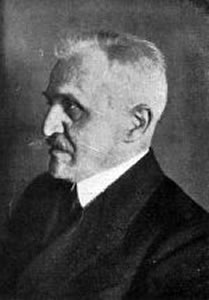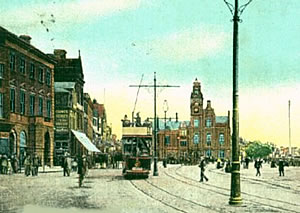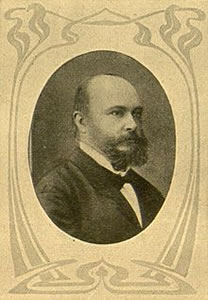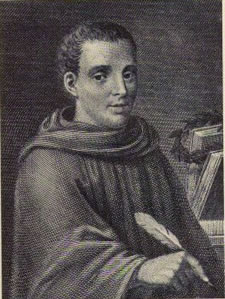|
De Poolse schrijver en vertaler Waclaw Berent werd geboren op 28 september 1873 in Warschau.
Waclaw Berent was een scherp criticus van de positivistische leuzen van de Poolse modernistische filosofie en van de Europese "Bohemien". In zijn roman Ozimina (Wintermaïs) schildert hij het opkomen van de verlangens naar de onafhankelijkheid van Polen. Hij was een fervent tegenstander van de Romantiek. Zijn belangrijkste werk was Żywe Kamien (Levende Stenen), een roman waarin hij een beeld schetste van de risico's die de morele waarden bedreigen in onze tijd van de industriële vooruitgang. In 1933 werd Waclaw Berent lid van de Poolse Academie van Literatuur.
xml:namespace prefix = o ns = "urn:schemas-microsoft-com:office:office" />
Uit: Wintersaat
Am anderen Ende des Salons summt gestenreich unter den Frauen eine zottige unruhige Gestalt und zieht mit zerstreut wirkenden Bewegungen weibliche Blicke auf sich: Summt wie ein Brummer um die Blüten. Schließlich läßt er sich auf der auserlesenen nieder: Eine Lilie mit einem Blick von zweifelhafter Jungfräulichkeit, die sich ständig mit Katzenpfötchen das schwarze Köpfchen putzt; so zauberhaft, so polsterwüchsig neigt sich diese Köpfchen zwischen den Schultern, daß diese vielverheißende Geste den Käfer angelockt hat. Er sitzt nieder und senkt den Rüssel in den Kelch, ob noch Honig darin sei: Ein Gespräch über Kunst und Literatur beginnt er, um Schlüpfriges anzubringen. Zottig schwebt er über dem Kelch, streckt die Fühler aus, betastet die großen Blätter, sucht nach ätherischen Ölen. er läßt Sprüche fallen, die unzüchtig wären ohne den Ernst des Themas: Ohne Kunst und Literatur, Da spritzt der leichte Honig auch für ihn. Der zottige Käfer hängt über dem Kelch, langt in die tiefste Scham der Blüte und inhaliert die ätherischen Wohlgerüchte lüsterner Konversation.
Junger Mann flirtet mit Fräulein.

Waclaw Berent (28 september 1873 - 19 of 22 november 1940)
De Britse criticus en dichter Francis Turner Palgrave werd geboren op 28 september 1824 in Great Yarmouth. Zie ook mijn blog van 28 september 2006 en ook mijn blog van 28 september 2008 en ook mijn blog van 28 september 2009.
The Golden Land
O SWEET September in the valley
Carved through the green hills, sheer and straight,
Where the tall trees crowd round and sally
Down the slope sides, with stately gait
And sylvan dance: and in the hollow
Silver voices ripple and cry
Follow, O follow!
Follow, O follow!--and we follow
Where the white cottages star the slope,
And the white smoke winds o'er the hollow,
And the blythe air is quick with hope;
Till the Sun whispers, O remember!
You have but thirty days to run,
O sweet September!
--O sweet September, where the valley
Leans out wider and sunny and full,
And the red cliffs dip their feet and dally
With the green billows, green and cool;
And the green billows archly smiling,
Kiss and cling to them, kiss and leave them,
Bright and beguiling:--
Bright and beguiling, as She who glances
Along the shore and the meadows along,
And sings for heart's delight, and dances
Crowned with apples, and ruddy, and strong:--
Can we see thee, and not remember
Thy sun-brown cheek and hair sun-golden,
O sweet September?

Francis Turner Palgrave (28 september 1824 24 oktober 1897)
Great Yarmouth Hall Quay met trams, rond 1900
De Duitse dichter Rudolf Baumbach werd op 28 september 1840 geboren in Kranichfeld/Ilm. Baumbach groeide op in Meiningen. Zie ook mijn blog van 28 september 2006.
Die Gäste der Buche
Mietegäste vier im Haus
hat die alte Buche:
Tief im Keller wohnt die Maus,
nagt am Hungertuche.
Stolz auf seinen roten Rock
und gesparten Samen,
sitzt ein Protz im ersten Stock;
Eichhorn ist sein Namen.
Weiter oben hat der Specht
seine Werkstatt liegen,
hackt und hämmert kunstgerecht,
dass die Späne fliegen.
Auf dem Wipfel im Geäst
pfeift ein winzig kleiner
Musikante froh im Nest.
Miete zahlt nicht einer.

Rudolf Baumbach (28 september 1840 21 september 1905)
De Italiaanse dichter en schrijver Agnolo Firenzuola (eigenlijk Michelangelo Girolamo Giovannini) werd geboren op 28 september 1493 in Florence. Firenzuola studeerde rechten in Siena, waar hij de schrijver Claudio Tolomei leerde kennen.aan wie hij zijn beroemde boek over de schoonheid van de vrouwen (della Bellezza delle Donne) opdroeg.. Tijdens zijn latere periode van studie in Perugia 1515/16 ontmoette hij de dichter Pietro Aretino. 1524 publiceerde hij zijn eerste werk Distaccamento de le lettere ne la lingua toscana inutilmente agguinte waarin hij zich tegen de hervormingsplannen van de Italiaanse taal van Gian Giorgio Trissino keerde. In Rome ontmoette hij een aantal van de beroemdste schrijvers van zijn tijd, zoals Francesco Berni, Giovanni Della Casa, Annibale Caro en Francesco Maria Molza. Lijdend aan syfilis verhuisde hij in 1534 terug naar Florence en tenslotte naar Prato, waar hij abt van het klooster van San Salvatore werd in het nabije Vaiano. Hier wijdde hij zich aan zijn studie en richtte de Accademia dell'Adaccio op. Geïnspireerd door Boccaccio en Aretino schreef Firenzuola levendige komedies en romans in de volkstaal, waarin hij vaak klassieke themas verwerkte.
Uit: Of the Beauty of Women, Dialogue
[..] whereas among those damsels who had been present on the mound during the former discourse, a strong desire remained to learn the composition of that fair one which Celso had promised to describe to them, they entreated Madonna Lampiada that she would name for another day a spot where this their desire might be fulfilled; and she, who hearkened no less willingly than they to the words of Celso, or at least feigned it, caused him to be bidden by her husband, a very ingenious gentleman, to come to his house on the next feast-day with these same ladies, and with others, and youths of their kindred, to spend the evening; and there, after that Celso had been duly entreated and had modestly excused himself, he began as follows: It is a certain truth that Nature is at all times a generous and liberal giver of her favours to the general and common herd of men ; but yet in particular cases it doth not appear that she is so; nay, we might affirm from daily experience that she is most miserly and avaricious, since, as we saw in our last discourse, she hath no doubt bestowed all things, yet hath not given all to all, but rather one thing to one and one to another, which thing the ancient poets expressedby figuring her a woman with many breasts, whence man, being unable to take more than a mouthful at a time, derives but a small part of his nutriment. Moreover, if you consider the nature of the breast, you will see that,, albeit it is of such fulness and abundance as we all know, yet it doth not pour forth milk of itself, but must be sucked.

Agnolo Firenzuola (28 september 1493 - 27 juni 1543)
Zie voor onderstaande schrijver ook mijn blog van 28 september 2009.
De Canadese schrijver Noël Laflamme werd geboren op 28 september 1950 in Saint-Adrien-d'Irlande als vijfde van in totaal dertien kinderen.
|



